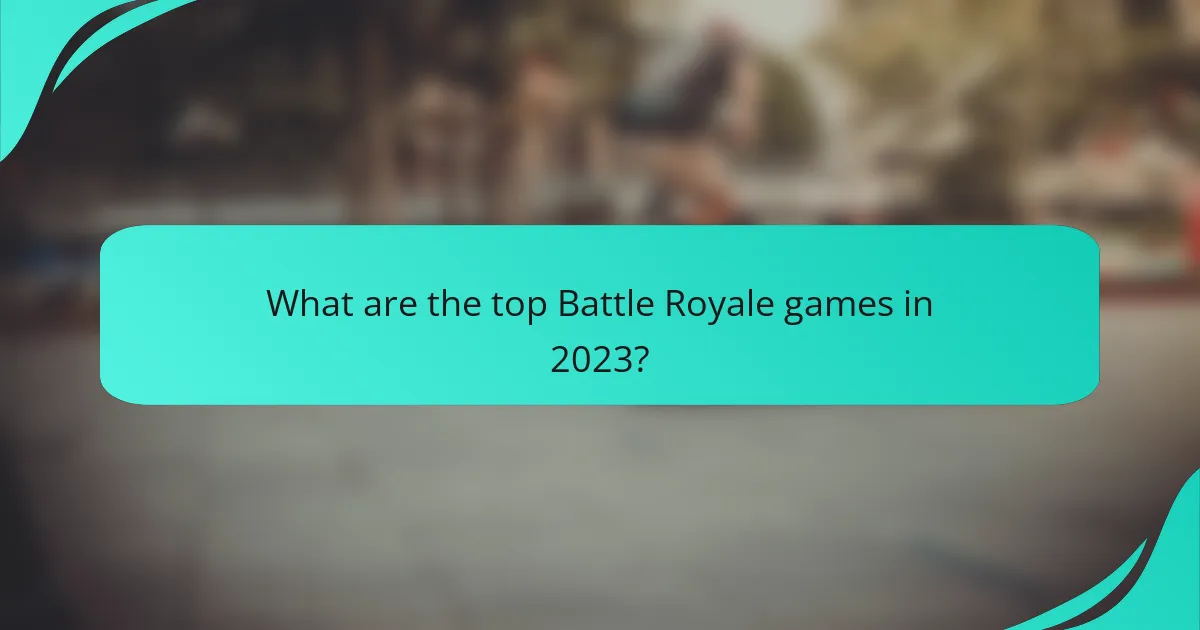Battle Royale games have surged in popularity, with titles like Fortnite, Apex Legends, and Call of Duty: Warzone leading the charge in 2023. This genre has evolved dramatically, introducing innovative mechanics and gameplay elements that enhance player engagement and competition. Key milestones in its history underscore the impact of these games on gaming culture and the continuous evolution of player experiences.

What are the top Battle Royale games in 2023?
In 2023, the leading Battle Royale games include Fortnite, Apex Legends, Call of Duty: Warzone, PlayerUnknown’s Battlegrounds (PUBG), and Fall Guys. Each game offers unique mechanics and experiences, catering to a wide range of player preferences and competitive styles.
Fortnite
Fortnite remains a dominant force in the Battle Royale genre, known for its vibrant graphics and building mechanics. Players compete in a colorful world where they can gather resources to construct structures, adding a strategic layer to traditional shooting gameplay.
The game features regular updates, seasonal events, and collaborations with popular franchises, keeping the content fresh and engaging. Players can choose between solo, duo, or squad modes, making it versatile for different play styles.
Apex Legends
Apex Legends distinguishes itself with its character-based gameplay, where players select unique Legends, each with special abilities. This adds depth to team strategies, as players must work together to leverage their characters’ strengths.
The game emphasizes fast-paced action and fluid movement, with mechanics like sliding and climbing. Regular seasonal updates introduce new Legends and maps, ensuring a dynamic gaming experience that keeps players returning.
Call of Duty: Warzone
Call of Duty: Warzone combines classic Call of Duty mechanics with Battle Royale elements, offering a gritty and realistic combat experience. Players can engage in large-scale battles with up to 150 participants, utilizing a variety of weapons and vehicles.
The game features a unique buy-back system, allowing players to return to the battlefield after being eliminated, which can significantly impact team dynamics. Frequent updates and seasonal content keep the gameplay fresh and competitive.
PlayerUnknown’s Battlegrounds (PUBG)
PlayerUnknown’s Battlegrounds (PUBG) is often credited with popularizing the Battle Royale genre. It focuses on realistic gunplay and tactical gameplay, where players must scavenge for weapons and supplies to survive.
With a more grounded approach compared to other titles, PUBG offers a slower-paced experience that emphasizes strategy and positioning. The game features various maps and modes, catering to both casual and competitive players.
Fall Guys
Fall Guys takes a different approach to the Battle Royale format, combining obstacle course challenges with multiplayer competition. Players navigate whimsical levels filled with traps and hurdles, aiming to be the last one standing.
This game is family-friendly and emphasizes fun over intense combat, making it accessible to a broader audience. Regular updates introduce new rounds and themes, keeping the gameplay lively and engaging for players of all ages.

How have Battle Royale games evolved over the years?
Battle Royale games have significantly evolved, introducing innovative mechanics and gameplay elements that enhance player engagement and competition. Key developments include building mechanics, unique character abilities, and dynamic seasonal updates that keep the gaming experience fresh and exciting.
Introduction of building mechanics in Fortnite
Fortnite revolutionized the Battle Royale genre by introducing building mechanics, allowing players to construct structures for defense or strategic advantage. This feature adds a layer of complexity, as players must balance combat skills with building proficiency to succeed.
Building in Fortnite involves gathering resources from the environment, which players can then use to create walls, ramps, and other structures. This mechanic encourages creativity and adaptability, making each match unique. New players should focus on mastering basic building techniques to improve their chances of survival.
Incorporation of unique character abilities in Apex Legends
Apex Legends introduced unique character abilities, giving each legend distinct skills that can influence gameplay. This innovation allows for diverse team compositions and strategies, as players can choose characters that complement each other’s strengths and weaknesses.
For example, some legends can provide healing, while others can create tactical advantages through mobility or crowd control. Understanding these abilities is crucial for team synergy, and players should experiment with different legends to find the best fit for their playstyle.
Seasonal updates and live events
Seasonal updates and live events have become a staple in Battle Royale games, providing new content and limited-time challenges that keep players engaged. These updates often include new maps, weapons, and gameplay modes, encouraging players to return regularly.
Live events, such as in-game concerts or story-driven experiences, create a sense of community and excitement among players. To make the most of these events, players should stay informed about upcoming changes and participate actively to unlock exclusive rewards and experiences.

What are the key milestones in Battle Royale history?
Key milestones in Battle Royale history highlight the genre’s evolution and impact on gaming culture. Significant events include the launch of popular titles, the introduction of innovative features, and shifts in player engagement.
Launch of PUBG in 2017
The release of PlayerUnknown’s Battlegrounds (PUBG) in 2017 marked a pivotal moment in the Battle Royale genre. It popularized the format, allowing up to 100 players to compete in a last-man-standing scenario on a large map.
PUBG’s realistic graphics and strategic gameplay attracted millions, leading to its rapid rise in popularity. The game’s success laid the groundwork for other developers to explore the Battle Royale format.
Fortnite’s massive popularity surge in 2018
In 2018, Fortnite experienced a massive surge in popularity, largely due to its unique building mechanics and vibrant art style. The game combined Battle Royale with creative elements, appealing to a broader audience, including younger players.
Fortnite’s free-to-play model and frequent updates kept players engaged, leading to record player counts and significant cultural impact, including collaborations with popular franchises and events.
Introduction of cross-platform play
The introduction of cross-platform play revolutionized the Battle Royale experience by allowing players on different consoles and PCs to compete against each other. This feature enhanced community engagement and expanded player bases.
Games like Fortnite and Call of Duty: Warzone embraced cross-platform capabilities, enabling friends to play together regardless of their gaming system. This shift has become a standard expectation in multiplayer gaming, fostering inclusivity and competition.

How do Battle Royale games impact competitive gaming?
Battle Royale games significantly influence competitive gaming by introducing large-scale multiplayer formats that emphasize survival and strategy. These games foster community engagement and create new opportunities for professional esports, attracting both players and viewers alike.
Emergence of esports tournaments
The rise of Battle Royale games has led to the establishment of numerous esports tournaments, offering substantial prize pools that can reach millions of dollars. Events like the Fortnite World Cup and PUBG Global Championship have drawn massive audiences, showcasing the competitive potential of these games.
These tournaments often feature a mix of solo and team formats, allowing for diverse gameplay experiences. Players can compete for recognition and financial rewards, driving interest in the competitive scene and inspiring new players to join.
Influence on game design and monetization
Battle Royale games have reshaped game design by prioritizing large maps, dynamic gameplay, and player-versus-player interactions. Developers are increasingly focusing on creating engaging environments that encourage exploration and strategic play, which has become a hallmark of the genre.
Monetization strategies have also evolved, with many Battle Royale titles adopting free-to-play models supported by in-game purchases. This approach allows for a broader player base while generating revenue through cosmetic items and battle passes, which enhance player engagement without impacting gameplay balance.

What are the criteria for choosing a Battle Royale game?
When selecting a Battle Royale game, consider gameplay mechanics, community support, and platform availability. These factors significantly influence your gaming experience and can determine how enjoyable and competitive the game will be.
Gameplay mechanics
Gameplay mechanics define how players interact within the game, including movement, combat systems, and unique features. Look for games that offer a balance between accessibility for newcomers and depth for seasoned players. Mechanics such as looting, building, or vehicle usage can greatly affect your strategy.
For example, games like Fortnite emphasize building structures, while PUBG focuses on realistic gunplay and tactics. Assess what mechanics resonate with your play style to enhance your enjoyment.
Community and support
A strong community and developer support can enhance your experience in a Battle Royale game. Active communities provide opportunities for teamwork, sharing strategies, and participating in events. Check forums, social media, and streaming platforms to gauge community engagement.
Additionally, consider how frequently developers release updates and address player feedback. Games with regular content updates and responsive support tend to maintain a more vibrant player base.
Platform availability
Platform availability is crucial when choosing a Battle Royale game, as it determines where you can play. Most popular titles are available on multiple platforms, including PC, consoles, and mobile devices. Ensure the game you choose supports your preferred gaming system.
Cross-platform play is another important feature, allowing you to compete with friends regardless of their device. Games like Call of Duty: Warzone and Apex Legends offer this functionality, making them more accessible for diverse player groups.
